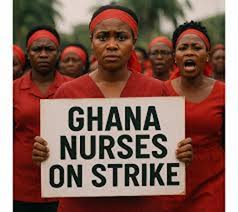Accra, Ghana – Dr. Sharif Mahmud Khalid, Economic Advisor to Ghana’s Vice President, has appealed to nurses and midwives across the country to exercise patience and allow the government time to address their outstanding demands in the 2026 national budget.
Dr. Khalid made this appeal during a current affairs programme on the Multimedia Network, where he explained that the government is currently grappling with severe economic constraints and heavy fiscal obligations inherited from the previous administration.
According to him, any immediate salary or allowance increases for nurses and midwives could destabilise the already fragile national budget and derail ongoing economic recovery plans.
“We are not ignoring your concerns. We recognise the vital role that nurses and midwives play in our society. But the reality is that we are operating under very tight fiscal space. We inherited debts and obligations that we must first honour before adding new ones,” he said.
The remarks came shortly after the Ghana Registered Nurses and Midwives Association (GRNMA) announced a temporary suspension of its industrial action. The association had embarked on a nationwide strike over stalled negotiations on their Collective Bargaining Agreement (CBA), which covers improved working conditions, allowances, and job-related benefits.
The strike, which disrupted emergency services and affected Out-Patient Departments (OPDs) across major hospitals, was put on hold following a meeting with the Parliament’s Select Committee on Health.
In a statement signed by GRNMA President Mrs. Perpetual Ofori-Ampofo, the union instructed its members to resume duties starting Saturday, June 14, while negotiations continue.
Dr. Khalid commended the union for showing leadership and a willingness to dialogue. “I want to personally thank the leadership of GRNMA for suspending the strike. That singular act shows patriotism and commitment to the well-being of Ghanaians.”
He reiterated that the government is not dismissing the demands of healthcare workers, but rather proposing a shift in timelines that would allow the state to make proper financial adjustments.
“We are not acting in bad faith. Just like individuals request for loan rescheduling, the government is also asking for understanding from our valued healthcare workers. We believe the 2026 budget provides a better window to accommodate your demands in full,” he said.
Dr. Khalid also advised all labour unions in the public sector to engage the government through dialogue instead of resorting to strikes, which he noted can weaken trust and damage the nation’s healthcare delivery.
“The government is committed to finding long-term solutions. But we need cooperation. Strikes are not the only way to get attention. Constructive conversations are more productive,” he added.
Ghana’s economy has been under pressure due to rising inflation, high debt servicing, and weak domestic revenue mobilisation. The current administration, led by President John Dramani Mahama, is implementing fiscal reforms aimed at stabilising the economy, creating jobs, and reviving key sectors like health and education.
The health sector, in particular, has faced years of underinvestment and staffing challenges, making nurses and midwives key voices in the country’s labour conversation.
Many analysts believe that if handled carefully, the current discussions could lead to improved conditions for healthcare workers and better healthcare services for the population.
For now, nurses and midwives are back to work, but with cautious optimism as they await the next round of negotiations. Their leaders have assured them that they are still in talks with Parliament and the Ministries of Finance and Health to ensure their issues are permanently resolved.
The government, on its part, is hopeful that through dialogue and compromise, industrial peace will be maintained while economic recovery continues.
